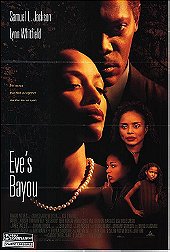Eve’s Bayou is a delicious little treat of Southern Gothic madness involving a family’s journey through one twisted summer. Actress turned writer/director Kasi Lemmons gives the entire film the aura of a folktale, and with the help of cinematography Amy Vincent renders the entire story and setting as an ambiguous and mysterious. That Eve’s Bayou is narrated from the titular character’s older self gives a stronger impact to the film-as-folktale since a child’s eyes cannot and do not completely understand the adult world.
We’re told through this narration that Eve gets her name from a freed slave descendant who was given the lands, and sixteen children, that her family currently lives in. They are a wealthy upper-middle class black family in a small town in Louisiana. They are the premiere family in the area, thanks to the name being passed down through the generations and her father’s work as a physician. It is during one of their parties that the film begins its layers of foresight, confusion, misdirection and half-truths. Eve clearly sees her philandering father engaging in a secretive tryst with a family friend’s wife, but is given different variations of what she clearly saw by both her sister and aunt. This clouds her memory and sight, which is a neat of way of foreshadowing how the film will end in pure confusion and events that seemed preordained from the beginning.
Into this pressure cooker of a story, Lemmons drops in an amazing group of actors, some of whom don’t get enough work or don’t actively seek out enough challenging work. Lynn Whitfield and Debbi Morgan fall into the former category while Samuel L. Jackson practically defines the latter. Jackson can be a very talented actor, but he’s often slumming and appearing in numerous projects far beneath him, and here he is clearly inspired and challenged by the material and complicated turns his character undergoes. He must play a man that we like, even when his actions and cockiness get in the way of that likability. Whitfield is all neurotic edge and beautiful artifice masking elemental rage and maternal worry as his long-suffering wife. Morgan, for me though, is the true standout and treasure of the film as Eve’s aunt with the gift of foresight and other strange quirks, which could be explain as mental illness but they’re so specifically detailed and tend to become true that there’s no other explanation for them but to be reality. Morgan has numerous delicious monolog’s, one in which she details the death of one of her husbands is a standout, which she devours with relish. Never overacting, Morgan is always subtle and graceful in displaying the various undercurrents of her stories and creates a haunting, powerhouse of a performance that was perhaps too subtle for the Academy to even throw her a Supporting Actress nomination which is an egregious error and pity.
Of course, without two strong performances from the main child actors the entire film would collapse. Luckily, Meagan Good as the older sister, Cisely, and Jurnee Smollett as Eve are up to the challenge. Smollett is particularly effective, registering the other-worldliness of Eve, she too seems to have been blessed with a supernatural gift, and has a tough, fierce core that works well with the character. Precociousness isn’t even a word that these two actresses come near in their performances, preferring to display maturity, grit and fire in their roles.
I have mentioned visions, foresight, magic (Diahann Caroll appears as a voodoo priestess, and it’s a deliriously strange and wonderful as it sounds) and so Eve’s Bayou constantly circles back in a manner similar to a fairy tale. We always return to whether these images can be trusted, or are they being pieced back together slowly from the memories of an adult looking back thirty years into the past? It’s hard to say. But this vagueness only added to my appreciation of the film. Is Eve’s Bayou a great film because of this dream-like, almost poetic memory rumination? Or is it great because this atmosphere only heightens the realistic performances? In the end, I think the curious strength and power of Eve’s Bayou comes across because it plays out like Ingmar Bergman directing a Tennessee Williams adaptation.
 Login
Login